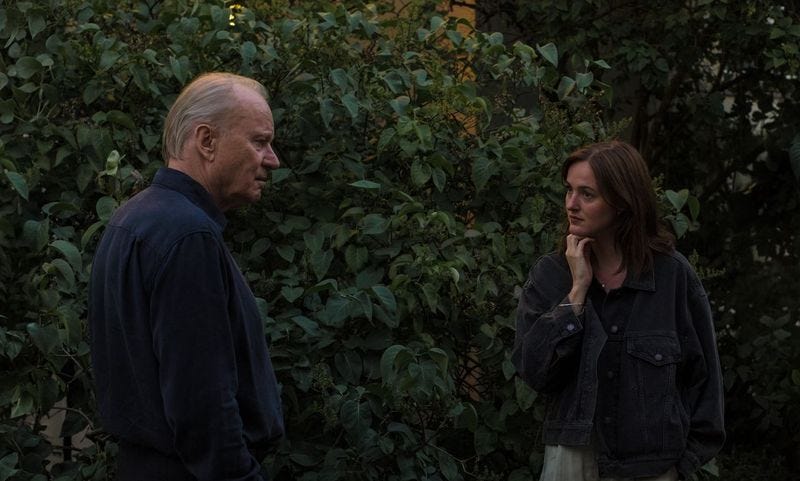VIFF: Sentimental Value, Miroirs No. 3
Sentimental Value (Joachim Trier):
In a premise that plays like a mix of Summer Hours and Cloud of Sils Maria, Joachim Trier’s Sentimental Value concerns an aging director, Gustav Borg (Stellan Skarsgard), who attempts to reconnect with his estranged daughters after their mother’s passing. He abandoned them for his career, and to win them back, he’s offering the lead role to his eldest daughter, Nora (Renate Reinsve) in a script about their family history. After she vehemently refuses, Gustav is forced to use his next best option, an American actress, Rachel Kemp (Elle Fanning). From there, the film follows this Hollywood production as the actors negotiate their emotional entanglements.
Initially, Sentimental Value seems like a more interesting film than it actually is, occupying a “two things can be true at once” position for most of its characters. Nora, an accomplished stage actress who only acts in repertory shows, can be rightfully skeptical of her father’s sudden interest and unhealthily tethered to the past. Rachel Kemp can be a bad actress (even though Elle Fanning’s performance is the film’s strongest) and a good person. Gustav Borg’s production can manipulatively sentimentalize the past and be driven by sincere regret. These meta complexities extend to the film itself, whose corporate chic style could be read as elusive, denying access to the characters’ inner lives beyond overwrought metaphors (an entire prologue devoted to explaining the metaphor of the family home is almost hilariously egregious) and handwavy references to the past. In other words, there seemed to be an intentional blandness behind the film’s half-assed nods towards political trauma (I loved that the festival screening of Borg’s Holocaust film looks godawful) and need to preciously underline its ideas that spoke to Trier’s sidestepping of yet another film about art as therapy…
Until the film eventually reveals itself as exactly that. We’re told that Gustav’s script miraculously understands his daughter’s nebulous mental illness, and once Rachel Kemp drops out, Nora agrees to take the role. With the “real” production now in full swing, they can finally heal. Sentimental Value ultimately doesn’t have the courage of its convictions. The easy, humanist resolutions and certainty that these are good artists actually undercut its vulnerability. I found it frustratingly superficial, and don’t think I’ll remember it by the end of the year.
Miroirs No. 3 (Christian Petzold):
While Christian Petzold’s last two features, Undine and Afire, suggested a major artist testing new waters, Miroirs No. 3 is quintessentially Petzoldian, a crystalline theme-and-variations film whose spare perfection only deepens its mystery. In what feels like a loose play on Petzold’s Ghosts trilogy, a piano student, Laura (Paula Beer), is involved with a car crash in the German countryside. Her boyfriend is instantly killed, but she is taken in by a mysterious woman, Betty (Barbara Auer), and to the dismay of Betty’s relatives, the two fall into a surrogate mother-daughter relationship.
Everyone instantly recognizes that Laura stands in for a deceased daughter (her name, Yelena is revealed very early), so Miroirs is instead about the sustenance of an illusory routine. In Afire, Petzold cited Rohmer as a reference for his take on a summer film, and Miroirs continues that direction. His portrait of provincial domesticity is founded on sensuous classicism, which makes the opaque characterizations all the more confounding. Why does Laura, who doesn’t seem to grieve boyfriend, and casually throws away her friends from university, stay with Betty? What are the motivations of Betty’s husband and son, mechanics who may moonlight as criminal operatives? As the other two members of this unstable nuclear family, the two men add a layer of menace to the entire affair, their reluctant acceptance of Laura feeling like it could burst into violence at a moment’s notice. None of this would work without Petzold’s masterful handling of tone and narrative. He knows exactly when to cut from an emotional climax, how to let symbols develop naturally (this is how you turn a house into a symbol!), and turn turmoil into something delicate and strange, not unlike the Ravel piece that gives the film its name.
The only character whose psychology is legible is Betty’s. Auer’s maternal gazes are effortlessly charged, and as the character whose fantasy is momentarily fulfilled, the construction and deconstruction of her desire is tragic in its obviousness. While in other Petzold films such as Phoenix, characters are often fleeing imposed projections, Miroirs shows a group who willingly play into Betty’s narrative as their own form of escapism. Her grief diverts attention from the suppressed emotions that inform their own delusions. From the hushed opening credits overlaid onto a ripple of water, Miroirs No. 3 realizes Betty’s lamentation near the film’s conclusion. “Nothing is okay here (…) You just can’t see it.”



